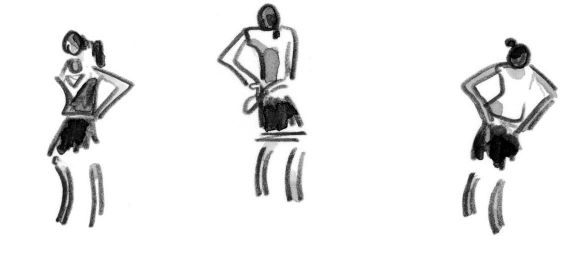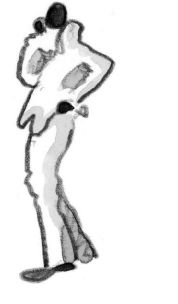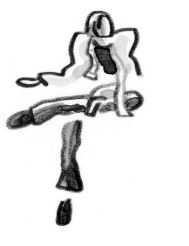Ridiculous/Hilarious/Terrible/Cool (6 page)
Read Ridiculous/Hilarious/Terrible/Cool Online
Authors: Elisha Cooper

Payton is punting a lot today. The varsity Grizzlies aren't enjoying themselves as much as they were earlier in the season when watching the J.V. get pummeled. But no one is really watching. The real game is in the stands, where students are looking behind them, talking on cell phones, letting friends know where they are.
“Where am
I
at? Where
you
at?” shouts one boy into his phone. Three girls with painted bear paw prints on their cheeks walk past. He waves and gives them air kisses, then keeps scanning for his friends.
I
at? Where
you
at?” shouts one boy into his phone. Three girls with painted bear paw prints on their cheeks walk past. He waves and gives them air kisses, then keeps scanning for his friends.
On the field, the cheerleaders and pom squad run through their cheers, but mostly stand with their hands in the small of their backs, looking up into the crowd. They don't have cell phones and it looks like they want them. The stands are bustling with planning for that evening.
“What you doing later?”

“We get a touchdown yet?”
“How much more time is left?”
“I put on weight during Ramadan because I eat all night!” says Aisha Kamillah Shaikh with a laugh. She wakes at four in the morning and drinks a glass of water. Then daybreak, and no eating or drinking. After school she goes home and naps until the sun sets. Then she gets up, does her homework, and eats everything in the house.
When Aisha's at school, it is easier to avoid food. Her lunch period is third period, so early she wouldn't eat anyway. She doesn't like the cafeteria either. Too bright, too exposed, with its harsh lighting and clamoring tables of cliques. Aisha prefers the library, ensconced in her carrel. A warm place, a place where she can take off her shoes.
Aisha scratches her foot and explains how her family treats Ramadan.
“The point is not to starve,” she says, “but to make yourself appreciate.”

Aisha sometimes feels guilty about not being a better Muslim. She doesn't wear a headscarf, she has an occasional drink. Her father isn't traditionalâhe allows wine during dinnerâand has never believed their faith should be a burden. Her parents didn't make Aisha fast on the day she took her ACT test.
The Shaikhs have found a mosque in Chicago that they like, though Aisha finds it odd to pray indoors. In Cairo, everyone prayed in the street. It's also odd that the imam speaks in English (he's African American), and makes jokes. In other mosques, the imams rant in Arabic, which drives Aisha away.
Aisha finds humor in almost anything (“Things that aren't funny, I find something to laugh about!” she says). The odder the better. Cultural references that initially bypass her, once she figures them out, are hilarious. It's a way of seeing America from an angle.
Last week Aisha flew to California to visit her older brother. He's a freshman at Harvey Mudd, one of the Claremont colleges. She liked his roommates, who were nerdy and smart.
Aisha wants to study political science when she goes to college, maybe attend law school afterward. Her Pakistani grandfather thinks Aisha should go to college in California so she can live with her brother, and get a few advanced degrees to enhance her marriage prospects. In an apparent contradiction, her grandfather also thinks she should marry at eighteen (she's seventeen now). He's coming to visit next month.
Aisha won't do something just because someone tells her. She's stubborn that way. Maybe she won't go to California, just to prove a point. Maybe she'll go to art school.
Aisha loves art. There's a portfolio class at Payton she's already enjoying. Ever since she can remember, she's kept sketchbooks filled with little drawings and snippets of paper. She has ones from China, where the Shaikhs lived when she was eight. Aisha wants to hang some of her paintings on the walls of the family's new Lincoln Park condominium. They're pretty bare right now. The floors, however, are covered in pillows and rugs. In the master bedroom, which Aisha shares with her little sister, there's a huge and intricate Pakistani rug, which, depending on the perspective it is looked at, completely changes color from dark to light.
Aisha has less energy for her art when she's fasting, less energy for anything. Sometimes it's hard to concentrate, to study, especially when the students in the next library carrel are munching on smuggled bars of candy. But
Eid ul-Fitr
is coming up, and the end of her fast. She can't wait to snack, to be able to eat whatever she wants whenever she wants. She's been dreaming of Reese's Pieces, and a hot dog with everything (except the pickles).
Eid ul-Fitr
is coming up, and the end of her fast. She can't wait to snack, to be able to eat whatever she wants whenever she wants. She's been dreaming of Reese's Pieces, and a hot dog with everything (except the pickles).
Mr. Dyson, a physics teacher at Payton, has a smooth shaved head the color of a chestnut. A football player in college, he seems to compensate for his imposing size and demeanor by speaking in an especially kind and patient manner. But Mr. Dyson is not himself today. Today he is
Bonginkosi
. It's Thursdayâthe day at Payton where students take seminars as varied as
The Israeli-Palestinian Conflict
and
Intro on B-boying
. This means that Mr. Dyson/
Bonginkosi
is teaching Zulu.
Bonginkosi
. It's Thursdayâthe day at Payton where students take seminars as varied as
The Israeli-Palestinian Conflict
and
Intro on B-boying
. This means that Mr. Dyson/
Bonginkosi
is teaching Zulu.

Eyes popping like Ping-Pong balls, gold hoop ear-ring shaking, he circles the room and slaps the surface of the tables and shouts
“Yebo!”
As he strides past the black-and-white poster of Einstein that, in a calmer moment, he hung on his classroom door, he is a wild man. The students stare at him wide-eyed. All the students, that is, except for Zef Calaveras, head resting comfortably on his desk, fast asleep.

“Yebo!”
As he strides past the black-and-white poster of Einstein that, in a calmer moment, he hung on his classroom door, he is a wild man. The students stare at him wide-eyed. All the students, that is, except for Zef Calaveras, head resting comfortably on his desk, fast asleep.

A few days later, Zef is awake. He's slumping on his bench under the atrium stairs. He yawns. He was late to school again. It's becoming a problem. He has nine tardies already this year, which, he says, is “ridiculous.”
Zef flips his bangs out of his eyes and leans back. If he leaned more he'd be flat. Two teachers walk past and ask where he was this morning. He mumbles something in response. Then, to no one in particular: “It sucks starting your day with lunch.”
Last night, Zef couldn't fall asleep. After walking the family dogs, he ate an entire pizza. Then he spent a couple hours laying down tracks on his computer. He still couldn't settle down. Even his bed didn't help. Zef has an electric remote-control bed he got from his grandmother, which allows him to raise his feet or his head, depending on the mood. The bed even vibrates, for added relaxation and comfort. Finally, at four in the morning, Zef slept. He says he has insomnia.
Coffee helps. On Zef's drive to school today he stopped at Starbucks and got a six shot, half-decaf, no water, iced venti Americano, which, he says, “gets you up very well.” He's nursing the dregs now.
“Usually when I leave school at the end of the day, I'm awake by then.”
Zef pauses to scratch his armpit.
“I should run on Pacific Coast Time!”
His joking aside, Zef doesn't like falling asleep in class. He'll be sitting in biology and dimly become aware that he physically cannot keep his eyes open. It feels like some great weight pushing down on him. Then he sleeps, and doesn't dream. It's not restful. And when the teacher wakes him, he finds he's often slept through most of class. Sleeping is hurting his schoolwork.
Zef sees a group of students approaching. They're preppy, put-together. When Zef notices students like these he thinks,
I am not like these people
. The students wave at Zef. Zef waves back. They keep walking. Zef also knows that students like these think he's cool, maybe because he's the guy who falls asleep in class.
I am not like these people
. The students wave at Zef. Zef waves back. They keep walking. Zef also knows that students like these think he's cool, maybe because he's the guy who falls asleep in class.
A girl in a wheelchair speeds past. Zef waves. “Rolling
thunder!
”
thunder!
”
The friend brakes and they talk. She keeps rolling. Two pretty girls approach, hands resting on their hips. From his prone position, Zef cocks his head sideways, smiling up at the girls through the strands of his hair, looking like a cat under a bird feeder. They gossip, smile broadly, leave. Zef takes a pull

 from his Americano and drums out a beat on his leg.
from his Americano and drums out a beat on his leg.


“Today's shaping up to be
all right
.” He chuckles. “Though, I forgot to do my homework.”
all right
.” He chuckles. “Though, I forgot to do my homework.”
Other books
The Dream Thief by Shana Abé
Pretty is as Pretty Dies (A Myrtle Clover Mystery) by Elizabeth Spann Craig
No Way to Start a War (TCOTU, Book 2) (This Corner of the Universe) by Ringel, Britt
Rescuing Rory by N.J. Walters
Aunt Erma's Cope Book by Erma Bombeck
Hacedor de estrellas by Olaf Stapledon
Lacy by Diana Palmer
Miedo y asco en Las Vegas by Hunter S. Thompson
Torment by Jeremy Seals